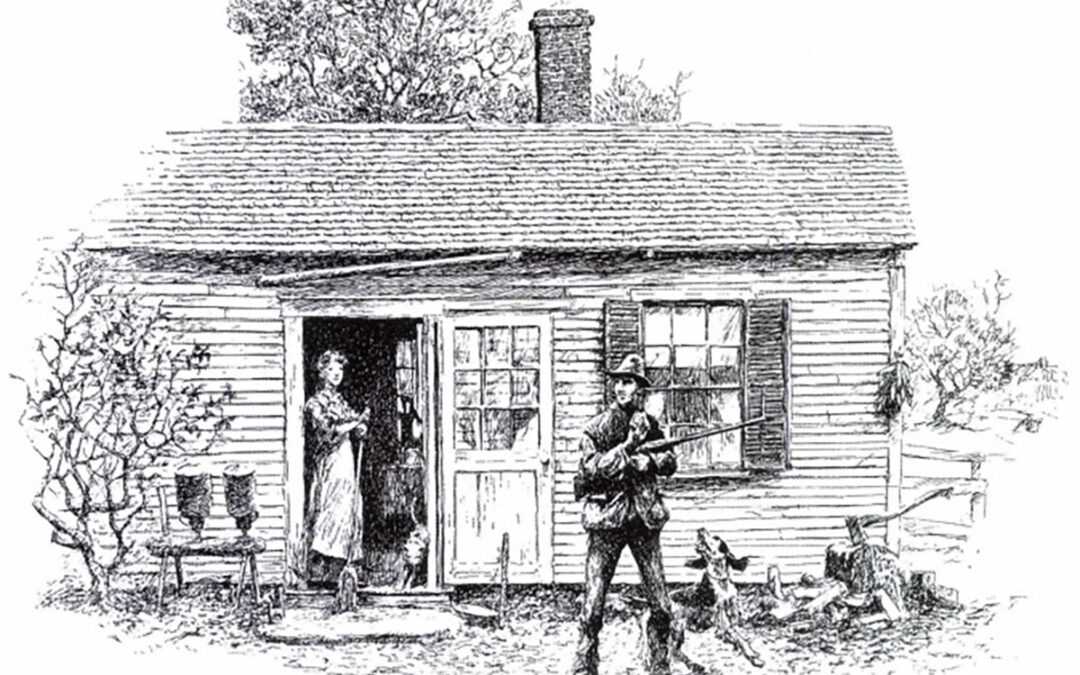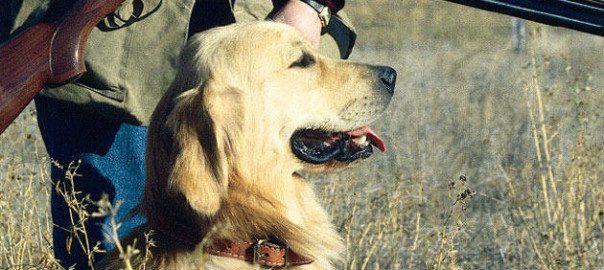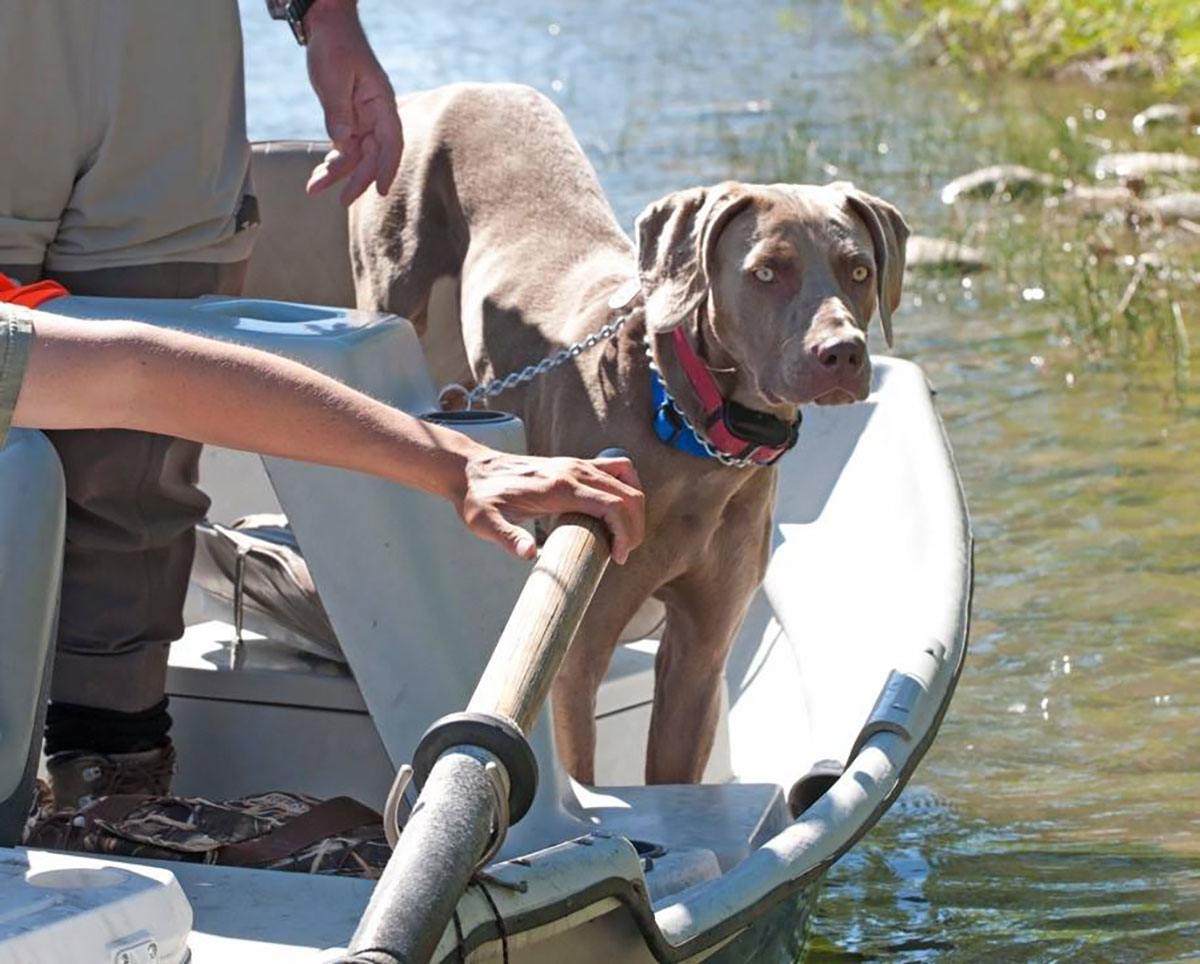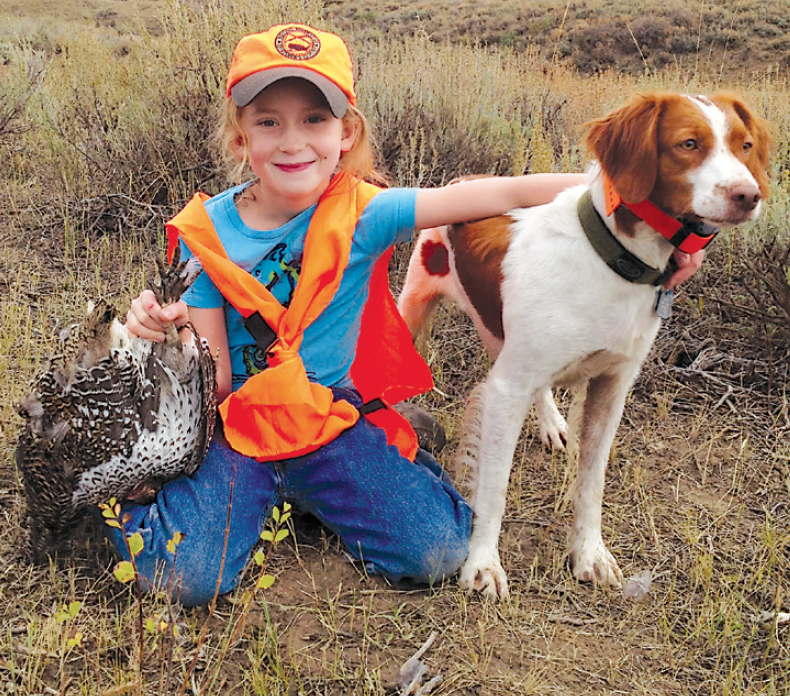Never said nothin’ to nobody,’ folks said of Clayton Flowers. But he’d talk to me, about livin‘ and even about dyin’.
I’ll tell this the way Clayton Flowers told it once to me. Clayton was an old man himself then, the deeper side of his 70s. Never talked to nobody much. Never married. Never held truck with town folk, or cottoned to company. Kept about the same distance from life the earth stays from the sun.
But he’d talk to me.
He lived in the woods with a couple of grouse dogs, on a click back in a hollow, on the Clarrie Thornton. And I never knew he’s in there. ‘Cept I got turned around one day, with a couple more — grouse dogs that is — and strayed into him. Or rather his two-by-twice shanty pegged there into the step of the hill. Stood uneasy by the break of the woods, I did, afore the man in the door shadow stepped out onto the porch. He had a shotgun in his hand — but then I did too. He never went to threaten me with it, just sat it down there agin’ the wall. He was thin and gnarly, Clayton was, flinty as Calvin County new ground, his dogs close the same. Twixt the glarin’ and the growlin’ I figured we’d not count for much. But I was wrong.
I think it was the setters. My dragged old canvas jacket. Anything else, he’d left me go.
He didn’t ask me my name. Didn’t ask me where I’s from. Didn’t require no particulars atall. He just read Illy dogs. After a while, once we’d made our peace and the growlin’ died out, he motioned me to a chair on the little porch. It was later still he said somethin’.
“Birds’re hard to come by ‘is year’,” he said. He never said much, but by the time I left, we’d notioned up why.
I got lost more after that, over the years more ways than one, but I could always find myself at Clayton Flower’s cabin. “Standoffish,” town folk said about Clayton Flowers. Never a word to nobody.
But he’d talk to me.
It was maybe two years fore he’uz dead he told me ’bout Burleigh Hardin.
I guess I’d heard about Burleigh Hardin most my life. Folks had said about the same thing about Burleigh they did about Clayton Flowers. Burleigh had come up hard, a simple man, and they never let him over it. His daddy was a moonshiner, and his mama was fancy, and nobody thought much about that. But he’d served prison time once, for beating a Carroll next-to-dead over kicking a fox hound, and Carrolls was decent folk, so people naturally forgot how Lauren Carroll deserved it. And then there was the thing about Lottie Lovett.
Burleigh Hardin was a legend, and I’d heard ’bout him most my life, but before Clayton, I never really knowed him.
Clayton got to know Burleigh while Clayton was still a boy. Burleigh musta been in his 40s then, hawking a mule team, snaking logs for Billy Flowers’ sawmill. Stayed to himself about the rest of ’em, Burleigh did,an’ they’s all notion able about him anyhow. But he took a shine to the boy. Come tea time — whenever they’d knock off at noon — he and the boy’d git off by themselves. Whittle mountain critters out of butternut roots, slap rocks with hickory slabs.
Whatever grew there between Burleigh Hardin and Clayton Flowers put down tap roots. Cause when Burleigh died, he’uz 96, and Clayton was the one that saw him buried. The only one, cause there wadn’t any kin left that’d claim him. They’s sociable nigh on to fifty years, Clayton and Burleigh.
”I’d go see Burleigh of a late afternoon usually,” Clayton told me, “’bout the time the old man’s mood would admit his matter. ‘A’ter his bones had settled,” Burleigh liked to say.
“Park my old truck at the Clover River bridge. About three hours before the sun drowned, in those clear, spring-fed waters the Lord laid to run east, by a shade south o’ west. Cause there warn’t any road in, just barely a woods path for near a mile. It’uz boogery in there, worse comin’ out in the dark. And that’uz the way Burleigh wanted it.
“The old man’s cabin was one knob high, up that first tall mountain, thereover the river. Burleigh said he’d not favor goin’ any higher, cause he wadn’t sure where he’d finally plumb out, Paradise or Purgatory.”
‘Lord er Lucifer,” Burleigh said, “he aimed to be convenient.”
”We’d sit there on his little porch, me and Burleigh, him arockin’ ag’in the settin’ sun, a glimmer of whiskers about his face.”
Clayton told me he never had much of a dog, or a gun, in the early years. But he had Burleigh. And whatever else he was without, Burleigh had the best. Some men laid store by black ground, or new clothes, or burley tobacco. Burleigh Hardin laid store by grouse dogs. They’d hunted all through these hills, Clayton and Burleigh. And in the latter years they’d sit on Burleigh’s porch, drink stiff cider, and remember about that, Clayton told me. The birds and the dogs and the days. That’s all the either of them ever wanted those last years. Cause Burleigh couldn’t go anymore, had buried the last of his dogs. And most of himself. And Clayton found he didn’t care as much about goin’ neither, without Burleigh.
It was only the once, Clayton told me one day, they ever talked about folks.
I knew it was then or never.
“Was it hue’?” I said. “‘Bout Lottie’?’”
Clayton gazed at me for several seconds afore he said anything, a glint of attrition in his eyes.
“You know his best setter ever he named Lottie,” he said.
“Ever’body knew ’bout Lottie,” I said, “she was near as famous as Burleigh.”
“I think he loved them about equally,” Clayton said.
“The setter and Lottie Lovett,” I said.
“Yes.
“She was the one tender moment of his life.”
“Like Becky Pritchard was yours,” I said.
“Yes.”
“Did he kill her?” I asked straight-out.
“Why?” Clayton said. “He loved her like a rose loves the dew.”
“What about Lannie Presnell,” I said, “Neither body was ever found. Burleigh Hardin spent seven months in the Watauga County jail willie they hied to make him guilty.”
Clayton gazed at me, appraising my bust. He never said nothin’.
“Burleigh showed me where he wanted me to bury him,” Clayton said after a time, “our last hunt together. They’uz beechnuts that year, and the foxgrapes were thick. “Afore I die or git too decrepit to know the difference,” Burleigh said, “I want you to promise.”
“So I did.”
“It was a little hollow, tucked away among the hills. Like a thousand others, but prettier. Trilliums in spring, heart-flowers in the fall.”
“That’s where you buried him?” I said.
“His ashes. Wadn’ what he wanted. . . he wanted to be there flesh and bone. But he knowed I couldn’t carry him there. I’ve been just the twice. Burleigh knew these hills like nobody eve r will. I’d not go back, even could I find it again.”
I asked no more. It was up to Clayton, if more there was to say. He had a faraway look on his face, his eyes leveled across the hills.
“They were to meet that day long ago, there on Nettle Creek,” he said.
“Lottie was freshening in the pool before he got there. Lannie found her there first.”
“All they ever found was the blood on the rocks,” I recalled.
“That’s all.”
“Their whereabouts forever a mystery,” I supposed.
Clayton looked away again.
“There was already a grave in that little hollow,” he said, “… an old black dog collar hangin’ on a limb. Burleigh told me it was Lottie.”
“The setter,” I said.
Clayton turned, loneliness in his eyes.
“I think rather the both of them,” he said.
Clayton Flowers passed the other day. Only thing left of him what he’d always said to me when I’d gotten myself lost again, the last thing Burleigh Hardin said to him …
“We do the best we can livin’, the best we can dying.”
Never said nothin’ to nobody, they said about Clayton Flowers.
But he’d talk to me.
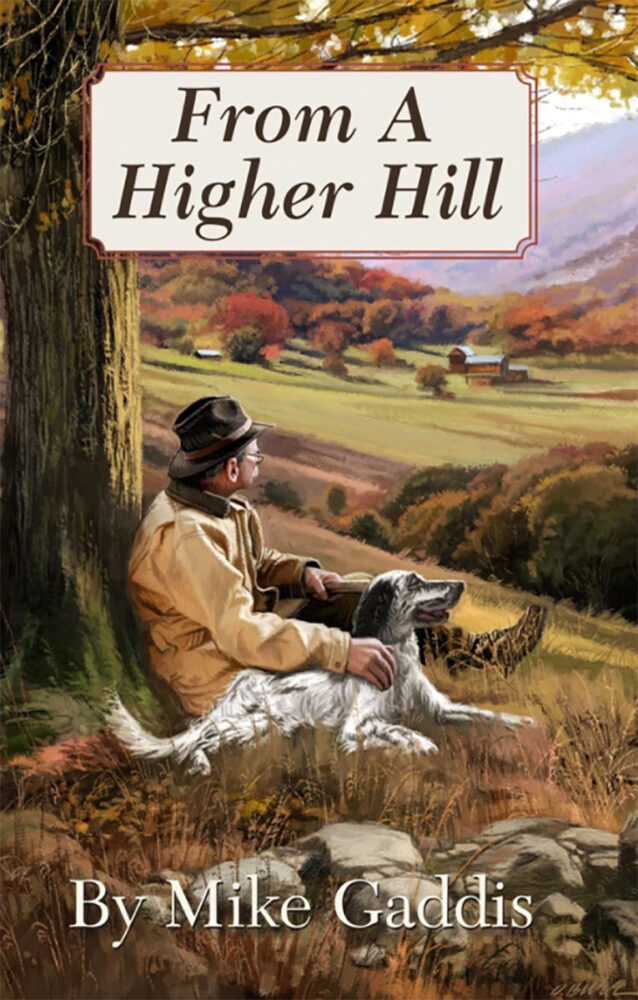 From A Higher Hill finds Mike Gaddis atop the enlightening vantage of almost eight decades. Looking back over the vast and enthralling sporting landscape of a life well lived. And ahead, to anticipate and savor whatever years are left to come. Buy Now
From A Higher Hill finds Mike Gaddis atop the enlightening vantage of almost eight decades. Looking back over the vast and enthralling sporting landscape of a life well lived. And ahead, to anticipate and savor whatever years are left to come. Buy Now

